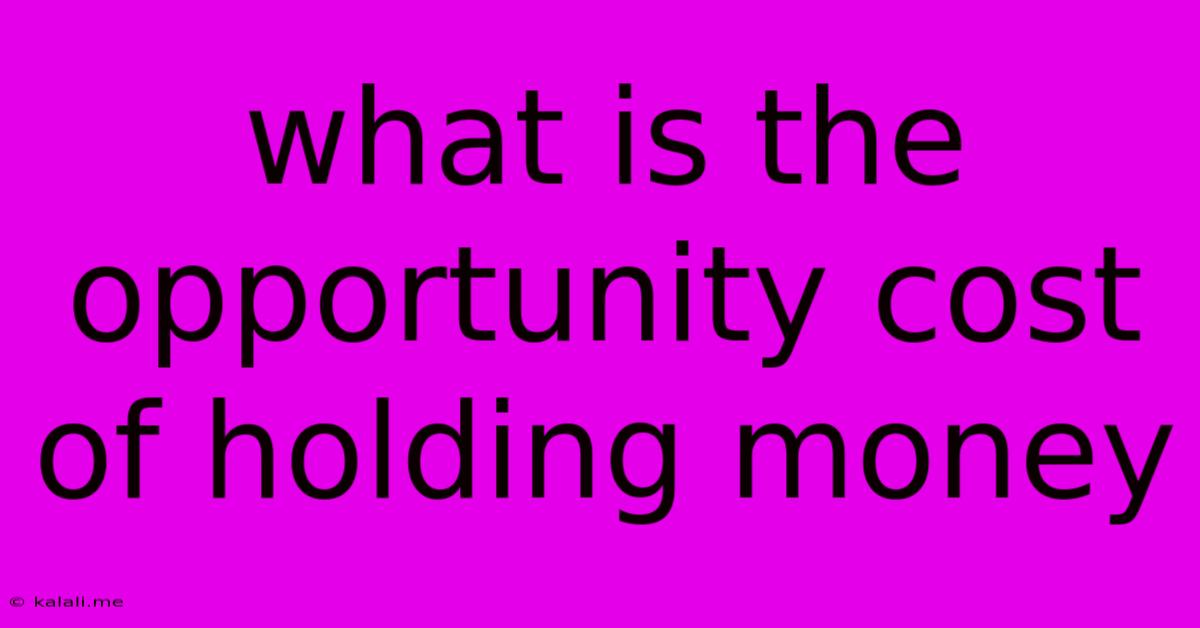What Is The Opportunity Cost Of Holding Money
Kalali
Jun 15, 2025 · 3 min read

Table of Contents
What is the Opportunity Cost of Holding Money?
Holding onto money, whether in a checking account, under your mattress, or even in a low-yield savings account, comes with an often-overlooked cost: opportunity cost. This article will explore what opportunity cost is in the context of holding money, and how understanding it can lead to better financial decisions. Understanding this concept is crucial for maximizing your financial potential. Let's dive in.
The opportunity cost of holding money refers to the potential return you forgo by not investing that money elsewhere. Essentially, it's the value of the next best alternative you could have chosen. Instead of letting your cash sit idle, you could be earning interest, dividends, or capital gains. This applies to various forms of holding money, from physical cash to low-interest bank accounts.
Different Ways to Look at Opportunity Cost of Holding Money
The opportunity cost isn't a fixed number; it depends entirely on the available alternatives and your risk tolerance. Let's explore some examples:
-
Holding Cash vs. Investing in Stocks: If you keep $10,000 in cash, you miss out on the potential returns from investing that money in the stock market. Over time, the stock market generally provides higher returns than keeping money in a non-interest-bearing account, although it also carries greater risk. The potential return from stocks represents the opportunity cost of holding cash.
-
Holding Money in a Low-Yield Savings Account: A savings account offers some security, but interest rates are often low, particularly in periods of low inflation. The opportunity cost here is the difference between the low interest earned and the potential return from higher-yield investments, such as bonds or real estate.
-
Keeping Money in a Checking Account: Checking accounts rarely offer interest. The opportunity cost is significant, especially in times of rising inflation; your money loses purchasing power.
-
Inflation's Impact: Inflation erodes the purchasing power of money over time. Holding onto cash during periods of high inflation results in a substantial opportunity cost because the real value of your money decreases.
Factors Influencing Opportunity Cost
Several factors affect the opportunity cost of holding money:
-
Interest Rates: Higher interest rates offered by savings accounts or other fixed-income investments reduce the opportunity cost of holding money compared to lower-rate environments.
-
Inflation Rates: High inflation increases the opportunity cost of holding cash since its purchasing power decreases.
-
Investment Opportunities: A wider range of attractive investment options (stocks, bonds, real estate, etc.) increases the opportunity cost of keeping money idle.
-
Risk Tolerance: Your risk tolerance plays a crucial role. Higher-return investments generally come with higher risk. If you're risk-averse, you might accept a lower return to avoid potential losses, leading to a lower perceived opportunity cost.
Minimizing the Opportunity Cost
Understanding opportunity cost allows you to make informed decisions about your finances. Here's how to minimize it:
-
Diversify Your Investments: Spread your money across different asset classes to balance risk and return.
-
Invest in Higher-Yield Investments: Explore investment options offering higher returns than basic savings accounts, but always consider your risk tolerance.
-
Regularly Review Your Portfolio: Market conditions change; regularly assess your investment strategy and make adjustments as needed.
-
Emergency Fund: While minimizing opportunity cost is important, maintaining an emergency fund is crucial for unforeseen circumstances. This fund should ideally be kept in a readily accessible, liquid account.
In conclusion, the opportunity cost of holding money is a significant factor to consider in your financial planning. By understanding this concept and exploring different investment options, you can make better decisions that maximize your wealth and achieve your financial goals. Ignoring opportunity cost can lead to lost potential gains and a diminished financial future.
Latest Posts
Latest Posts
-
How Much Atp Produced In Photosynthesis
Jun 16, 2025
-
What Is The Horizontal Row In The Periodic Table
Jun 16, 2025
-
Relation Between Linear Velocity And Angular Velocity
Jun 16, 2025
-
Lcm Of 4 7 And 6
Jun 16, 2025
-
What Is The Opposite Of Proud
Jun 16, 2025
Related Post
Thank you for visiting our website which covers about What Is The Opportunity Cost Of Holding Money . We hope the information provided has been useful to you. Feel free to contact us if you have any questions or need further assistance. See you next time and don't miss to bookmark.